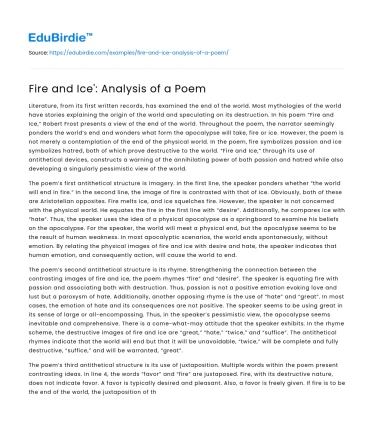Literature, from its first written records, has examined the end of the world. Most mythologies of the world have stories explaining the origin of the world and speculating on its destruction. In his poem “Fire and Ice,” Robert Frost presents a view of the end of the world. Throughout the poem, the narrator seemingly ponders the world’s end and wonders what form the apocalypse will take, fire or ice. However, the poem is not merely a contemplation of the end of the physical world. In the poem, fire symbolizes passion and ice symbolizes hatred, both of which prove destructive to the world. “Fire and Ice,” through its use of antithetical devices, constructs a warning of the annihilating power of both passion and hatred while also developing a singularly pessimistic view of the world.
The poem’s first antithetical structure is imagery. In the first line, the speaker ponders whether “the world will end in fire.” In the second line, the image of fire is contrasted with that of ice. Obviously, both of these are Aristotelian opposites. Fire melts ice, and ice squelches fire. However, the speaker is not concerned with the physical world. He equates the fire in the first line with “desire”. Additionally, he compares ice with “hate”. Thus, the speaker uses the idea of a physical apocalypse as a springboard to examine his beliefs on the apocalypse. For the speaker, the world will meet a physical end, but the apocalypse seems to be the result of human weakness. In most apocalyptic scenarios, the world ends spontaneously, without emotion. By relating the physical images of fire and ice with desire and hate, the speaker indicates that human emotion, and consequently action, will cause the world to end.
Save your time!
We can take care of your essay
- Proper editing and formatting
- Free revision, title page, and bibliography
- Flexible prices and money-back guarantee
The poem’s second antithetical structure is its rhyme. Strengthening the connection between the contrasting images of fire and ice, the poem rhymes “fire” and “desire”. The speaker is equating fire with passion and associating both with destruction. Thus, passion is not a positive emotion evoking love and lust but a paroxysm of hate. Additionally, another opposing rhyme is the use of “hate” and “great”. In most cases, the emotion of hate and its consequences are not positive. The speaker seems to be using great in its sense of large or all-encompassing. Thus, in the speaker’s pessimistic view, the apocalypse seems inevitable and comprehensive. There is a come-what-may attitude that the speaker exhibits. In the rhyme scheme, the destructive images of fire and ice are “great,” “hate,” “twice,” and “suffice”. The antithetical rhymes indicate that the world will end but that it will be unavoidable, “twice,” will be complete and fully destructive, “suffice,” and will be warranted, “great”.
The poem’s third antithetical structure is its use of juxtaposition. Multiple words within the poem present contrasting ideas. In line 4, the words “favor” and “fire” are juxtaposed. Fire, with its destructive nature, does not indicate favor. A favor is typically desired and pleasant. Also, a favor is freely given. If fire is to be the end of the world, the juxtaposition of the words favor and fire further indicate the pessimistic view of the speaker. The favor is the destruction of the world and the elimination of the passion and hate that truly tears the world apart. In line 5, the speaker juxtaposes “perish” with “twice”. The speaker is sinking further into depression and pessimism. The contemplation of death is a depressing subject, and by juxtaposing “perish” with “twice,” the speaker indicates that he is not only pondering death but that it also is constant.
The last antithesis in the poem is implied rather than implicit. The poem indicates a juxtaposition of the ego and society. In its opening lines, the speaker refers to “some” who predict the end of the world. But, this reference to the many quickly turns to the “I”. The speaker does not appear to care what others believe about the end of the world. Also, the most dominant letter in the poem is “i.” The letter occurs 21 times in 9 short lines. This prevalence of the letter indicates that the speaker is obsessed with himself and his interpretation. Additionally, by tackling the idea of the apocalypse, the speaker is putting himself in a position of self against the whole. What is most pessimistic about his view is that he does not appear to care about the other people that will die or even how they will die, be it fire or ice.
Through its use of antithesis, this poem develops a pessimistic view of the world and its fate. Positive words such as “desire” and “great” become twisted by the use of rhyme and juxtaposition. Whereas desire usually indicates lust, ambition, and craving, in this poem it is a longing for the end of the world. Overall, while the speaker appears to abhor the passionate hate that can destroy the world, he also appears to be fatalistic and even desiring of the end.






 Stuck on your essay?
Stuck on your essay?

